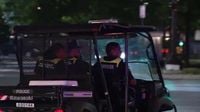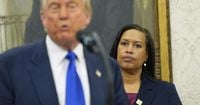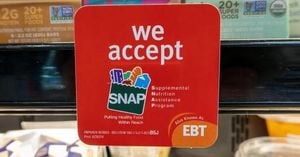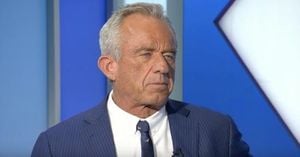In a dramatic escalation of federal involvement in local affairs, President Donald Trump has launched a sweeping law enforcement surge across Washington, D.C., deploying hundreds of federal officers and raising the specter of a full federal takeover of the nation’s capital. The move, which began in earnest on August 7, 2025, follows a high-profile assault on a federal staffer and comes amid contentious debate over the true state of crime in the city and the future of its local governance.
The catalyst for this extraordinary federal push was an assault that occurred over the weekend of August 3-4, when Edward Coristine, a staffer in Elon Musk’s Department of Government Efficiency—known by the nickname “Big Balls”—was beaten and suffered a concussion in an attempted carjacking. According to Reuters, Trump cited the attack as evidence of what he called a crisis of lawlessness in D.C., telling reporters, “We have a capital that’s very unsafe. We have to run D.C. This has to be the best-run place in the country.”
In the wake of the incident, Trump signaled his intent to deploy the National Guard and increase federal law enforcement presence. A White House official told Reuters that officers from the FBI, National Guard, U.S. Immigration and Customs Enforcement, and the Department of Homeland Security would be participating in the surge. Starting August 7, the city saw a significant influx of federal officers—about 450 from nearly 20 agencies, including the Metro Transit Police, Amtrak Police, U.S. Capitol Police, DEA, ATF, U.S. Marshals Service, and others, according to FOX 5 DC and White House officials.
Despite the president’s warnings of a city “plagued by petty and violent crime for far too long,” data from the Metropolitan Police Department paints a different picture. Violent crime in the first seven months of 2025 was down 26% compared to 2024, and overall crime was down about 7%. In fact, 2024 had already seen a 15% decrease in overall crime from the previous year. Carjackings, which had spiked in 2023, dropped from 957 that year to under 500 in 2024, and were on track to decline further in 2025, with less than 200 recorded by mid-year, as reported by the Associated Press.
The initial nights of the surge were marked by a heavy, but not always visible, law enforcement presence. An Associated Press report described scenes on U Street and other nightlife districts in the early hours of August 8, where crowds mingled and city police patrolled, but there was no overt federal lockdown. However, by Saturday, August 9, the White House confirmed that approximately 450 federal officers were deployed across all four city quadrants. Arrests on Friday night included charges for carrying a pistol without a license, apprehending a fugitive from Maryland, driving on a suspended license, and dirt bike riding in a park. Officers also seized three guns, one of which was stolen, according to White House officials.
Mayor Muriel Bowser, who had been notably silent in the initial days following Trump’s announcement, broke her silence on Sunday, August 10, during an appearance on MSNBC’s "The Weekend." She clarified her administration’s relationship with federal agencies, stating, “Federal law enforcement is always on the street in D.C. and we always work cooperatively with them.” Bowser downplayed the notion of a crime wave, emphasizing, “This is what I know: we are not experiencing a crime spike.” She noted that the arrests made by federal officers during the surge “sounded like a typical MPD rundown of arrests I review on a daily basis.”
Bowser also addressed Trump’s claim that his actions would “essentially stop violent crime in Washington, D.C.” She speculated that the president’s press conference, scheduled for Monday, would likely announce even larger numbers of federal officers or an extended duration for the surge. “He’s interested in being in neighborhoods, fighting crime in neighborhoods,” she said. However, Bowser pushed back on the need for federal intervention, pointing to the city’s recent progress: “Carjacking had been our most concerning group of crime since 2023, and we’ve seen a 50% drop since 2023. This year we are also seeing that decline.”
Trump, for his part, has not shied away from threatening more drastic measures. He told reporters he was considering everything from bringing in the National Guard to repealing Washington’s limited “home rule” autonomy, which allows the city to elect its own mayor and council. “If D.C. doesn’t get its act together, and quickly, we will have no choice but to take Federal control of the City, and run this City how it should be run,” Trump wrote on Truth Social. According to the Associated Press, Trump said lawyers were already examining the possibility of overturning the Home Rule Act of 1973—a move that would require congressional approval and almost certainly face legal challenges.
Legal experts, as noted by the Associated Press, agree that while the president is within his authority to deploy federal law enforcement and the National Guard in D.C., a full federal takeover of the police department or city governance would demand a declaration of emergency and legislative action to repeal home rule. Monica Hopkins, executive director for the ACLU of the District of Columbia, explained that the Home Rule Act—signed by President Nixon—was specific to D.C. and not seen in other American cities, underscoring the unique status of the capital.
Beyond policing, the Trump administration has also stepped up efforts to address homelessness and public disorder on federal land. The National Park Service, which controls large swaths of D.C., has increased the clearing of homeless encampments and recently carried out arrests for public marijuana use. In a recent executive order, Trump directed the restoration of a Confederate statue toppled during protests in 2020, further stoking controversy.
Mayor Bowser, meanwhile, has suggested that if Trump truly wants to improve the quality of life for D.C. residents, he should focus on addressing judicial vacancies and infrastructure issues, rather than simply increasing police presence. “There are many ways he could do so beyond increasing federal law enforcement presence,” Bowser said, emphasizing the need for more judges, prosecutors, and basic city services.
As federal officers continue their patrols and city leaders brace for further announcements, the future of Washington, D.C.’s autonomy and the balance of power between local and federal authorities hang in the balance. The coming days—and the president’s next moves—will be watched closely by residents, lawmakers, and the nation at large.





